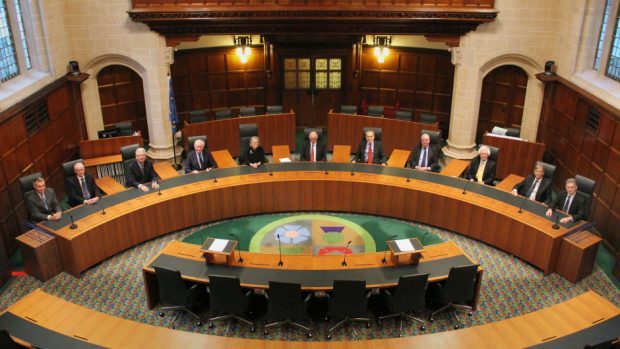Brexit negotiations can begin without Holyrood’s consent, the Supreme Court has heard.
Lord Keen, Advocate General for Scotland, said the triggering of Article 50 fell within the royal prerogative.
He was making the case for the UK Government on the second day of the landmark challenge in London.
The Scottish Government, which has been allowed to make representations, believes the Scottish Parliament should be consulted before departure talks get under way.
Its top law officer, Lord Advocate James Wolffe, will put forward his arguments later in the week.
But Lord Keen said yesterday that powers over foreign affairs and international relations, including EU membership, were reserved to Westminster and therefore not within the authority of the Scottish Parliament.
He told the 11-strong panel of judges it was “perfectly clear” that the royal prerogative applied in Scotland, Wales and Northern Ireland as well as England, insisting its use was a matter for the UK Government.
With regard to Scottish devolution legislation, he said: “All foreign relations and foreign affairs, in particular all our relationships with the EU, are not within the competence of the devolved legislators.
“There is no means by which you can suggest the exercise of the foreign affairs prerogative is in any way impinged or qualified by devolution legislation.”
Lord Keen also argued that the Sewel Convention was a political accord and so not a legal obstacle to triggering Article 50.
Part of the 1998 devolution settlement, it applies when the UK Parliament legislates on a matter which is normally dealt with by Holyrood as part of its work.
Under the terms of the convention, this will happen only if the Scottish Parliament has given its consent.
The latest hearing follows a ruling by the High Court last month that Theresa May does not have the power to use the royal prerogative to kick-start the Brexit process without the prior authority of the Westminster Parliament.
Lord Pannick QC, who is representing the lead claimant in the successful High Court review Gina Miller, made the same argument yesterday.
“Parliament is sovereign. What parliament created only parliament can take away,” he said.
But James Eadie QC, for the UK Government, rejected the suggestion the Brexit strategy was an “affront” to parliamentary sovereignty.
The case is due to finish tomorrow, but a judgement is not expected until the new year.
